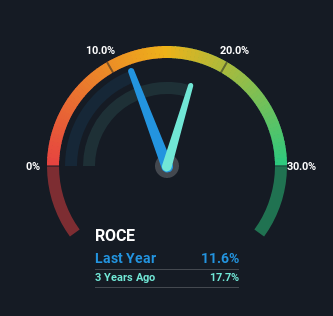- South Africa
- /
- Professional Services
- /
- JSE:PMV
Be Wary Of Primeserv Group (JSE:PMV) And Its Returns On Capital
There are a few key trends to look for if we want to identify the next multi-bagger. Ideally, a business will show two trends; firstly a growing return on capital employed (ROCE) and secondly, an increasing amount of capital employed. Put simply, these types of businesses are compounding machines, meaning they are continually reinvesting their earnings at ever-higher rates of return. Although, when we looked at Primeserv Group (JSE:PMV), it didn't seem to tick all of these boxes.
Understanding Return On Capital Employed (ROCE)
For those who don't know, ROCE is a measure of a company's yearly pre-tax profit (its return), relative to the capital employed in the business. The formula for this calculation on Primeserv Group is:
Return on Capital Employed = Earnings Before Interest and Tax (EBIT) ÷ (Total Assets - Current Liabilities)
0.12 = R22m ÷ (R226m - R39m) (Based on the trailing twelve months to September 2021).
So, Primeserv Group has an ROCE of 12%. That's a relatively normal return on capital, and it's around the 13% generated by the Professional Services industry.
See our latest analysis for Primeserv Group

Historical performance is a great place to start when researching a stock so above you can see the gauge for Primeserv Group's ROCE against it's prior returns. If you're interested in investigating Primeserv Group's past further, check out this free graph of past earnings, revenue and cash flow.
So How Is Primeserv Group's ROCE Trending?
On the surface, the trend of ROCE at Primeserv Group doesn't inspire confidence. Over the last five years, returns on capital have decreased to 12% from 16% five years ago. On the other hand, the company has been employing more capital without a corresponding improvement in sales in the last year, which could suggest these investments are longer term plays. It's worth keeping an eye on the company's earnings from here on to see if these investments do end up contributing to the bottom line.
On a side note, Primeserv Group has done well to pay down its current liabilities to 17% of total assets. That could partly explain why the ROCE has dropped. What's more, this can reduce some aspects of risk to the business because now the company's suppliers or short-term creditors are funding less of its operations. Since the business is basically funding more of its operations with it's own money, you could argue this has made the business less efficient at generating ROCE.
The Bottom Line On Primeserv Group's ROCE
To conclude, we've found that Primeserv Group is reinvesting in the business, but returns have been falling. Yet to long term shareholders the stock has gifted them an incredible 150% return in the last five years, so the market appears to be rosy about its future. Ultimately, if the underlying trends persist, we wouldn't hold our breath on it being a multi-bagger going forward.
If you want to know some of the risks facing Primeserv Group we've found 3 warning signs (1 doesn't sit too well with us!) that you should be aware of before investing here.
While Primeserv Group may not currently earn the highest returns, we've compiled a list of companies that currently earn more than 25% return on equity. Check out this free list here.
New: Manage All Your Stock Portfolios in One Place
We've created the ultimate portfolio companion for stock investors, and it's free.
• Connect an unlimited number of Portfolios and see your total in one currency
• Be alerted to new Warning Signs or Risks via email or mobile
• Track the Fair Value of your stocks
Have feedback on this article? Concerned about the content? Get in touch with us directly. Alternatively, email editorial-team (at) simplywallst.com.
This article by Simply Wall St is general in nature. We provide commentary based on historical data and analyst forecasts only using an unbiased methodology and our articles are not intended to be financial advice. It does not constitute a recommendation to buy or sell any stock, and does not take account of your objectives, or your financial situation. We aim to bring you long-term focused analysis driven by fundamental data. Note that our analysis may not factor in the latest price-sensitive company announcements or qualitative material. Simply Wall St has no position in any stocks mentioned.
About JSE:PMV
Primeserv Group
An investment holding company, provides integrated business support services in South Africa.
Flawless balance sheet with solid track record and pays a dividend.
Market Insights
Community Narratives



